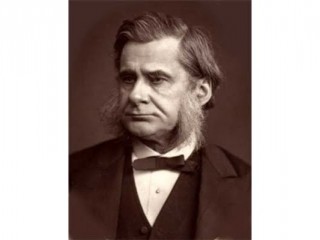
Thomas Henry Huxley biography
Date of birth : 1825-05-04
Date of death : 1895-06-29
Birthplace : London,England
Nationality : English
Category : Science and Technology
Last modified : 2011-12-20
Credited as : Biologist, nown as "Darwin's Bulldog", Debated Wilberforce over evolution
0 votes so far
Huxley's famous 1860 debate with Samuel Wilberforce was a key moment in the wider acceptance of evolution, and in his own career. Huxley had been planning to leave Oxford on the previous day, but, after an encounter with Robert Chambers, the author of Vestiges, he changed his mind and decided to join the debate. Wilberforce was coached by Richard Owen, against whom Huxley also debated whether humans were closely related to apes.
Huxley was slow to accept some of Darwin's ideas, such as gradualism, and was undecided about natural selection, but despite this he was wholehearted in his public support of Darwin. He was instrumental in developing scientific education in Britain, and fought against the more extreme versions of religious tradition.
Huxley coined the term 'agnostic' to describe his own views on theology, a term whose use has continued to the present day (see Thomas Henry Huxley and agnosticism).
Huxley had little formal schooling and taught himself almost everything he knew. Remarkably, he became perhaps the finest comparative anatomist of the latter 19th century. He worked on invertebrates, clarifying relationships between groups previously little understood. Later, he worked on vertebrates, especially on the relationship between apes and humans. After comparing Archaeopteryx with Compsognathus, he concluded that birds evolved from small carnivorous dinosaurs, a theory widely accepted today.
The tendency has been for this fine anatomical work to be overshadowed by his energetic and controversial activity in favour of evolution, and by his extensive public work on scientific education, both of which had significant effects on society in Britain and elsewhere.
He was awarded the highest honours then open to British men of science. The Royal Society, who had elected him as Fellow when he was 25 (1851), awarded him the Royal Medal the next year (1852), a year before Charles Darwin got the same award. He was the youngest biologist to receive such recognition. Then later in life came the Copley Medal in 1888 and the Darwin Medal in 1894; the Geological Society awarded him the Wollaston Medal in 1876; the Linnean Society awarded him the Linnean Medal in 1890.
Huxley was for about thirty years evolution's most effective advocate, and for some Huxley was "the premier advocate of science in the nineteenth century [for] the whole English-speaking world".
In November 1864 Huxley succeeded in launching a dining club, the X Club, like-minded people working to advance the cause of science; not surprisingly, the club consisted of most of his closest friends. There were nine members, who decided at their first meeting that there should be no more. The members were: Huxley, John Tyndall, J.D. Hooker, John Lubbock (banker, biologist and neighbour of Darwin), Herbert Spencer (social philosopher and sub-editor of the Economist), William Spottiswoode (mathematician and the Queen's Printer), Thomas Hirst (Professor of Physics at University College London), Edward Frankland (the new Professor of Chemistry at the Royal Institution) and George Busk, zoologist and palaeontologist (formerly surgeon for HMS Dreadnought).
All except Spencer were Fellows of the Royal Society. Tyndall was a particularly close friend; for many years they met regularly and discussed issues of the day. On more than one occasion Huxley joined Tyndall in the latter's trips into the Alps and helped with his investigations in glaciology.
Huxley was also an active member of the Metaphysical Society, which ran from 1869–80. It was formed around a nucleus of clergy and expanded to include all kinds of opinions. Tyndall and Huxley later joined The Club (founded by Dr. Johnson) when they could be sure that Owen would not turn up.
















